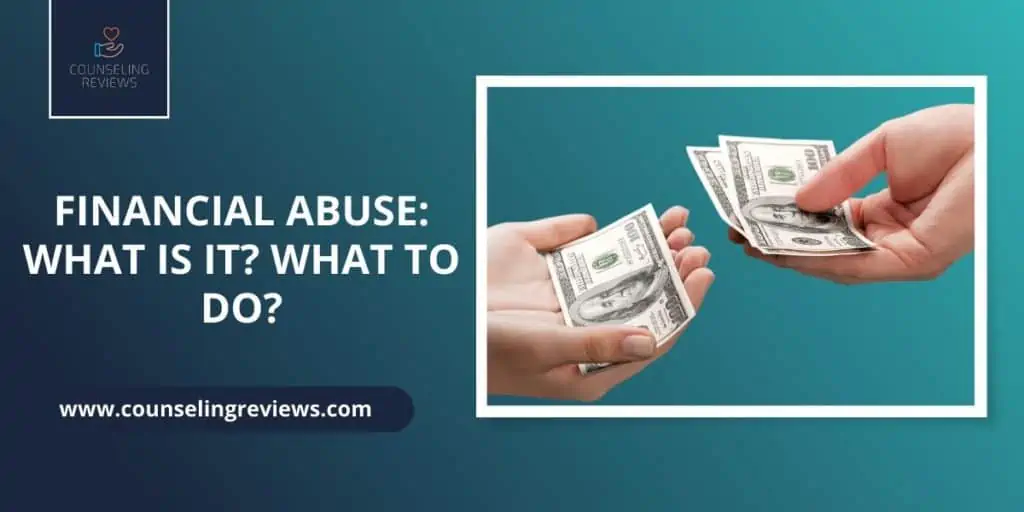With money becoming essentially, the lifeblood of society, and the only real way to a “trouble-free life,” having money gives you power. If you are someone who depends entirely on another person for money or overall well-being, it can be easy to feel at the mercy of that person. Financial abuse occurs when that person in a position of power uses that financial power to force the other person into doing different things.
This is not to say that any relationship where only one person is providing money is an abusive relationship and that this means everyone should go out and work. Abusive people tend to be that way, regardless of whether or not they have money! Financial abuse tends to be a little different, though than physical abuse, even though at times, they can go hand and hand.

How To Know If You Are In An Abusive Relationship
As we mentioned, at times, financial abuse can be different than physical abuse. In domestic violence cases, if you are getting physically hurt by a person, you should find a way of leaving an abusive relationship. In a financially abusive relationship, the person with the money has all of the leverage, so he or she can use that leverage and power to force people to do what they want.
One of the most common forms of financial abuse in relationships that we see is an act like withholding money from abusive partners. Also, making threats about personal finances often occurs. These tend to come in the form of the abusive party threatening to leave their partner on the streets if he or she decides to leave the relationship.
Impact of Financial Abuse
The ramifications of other forms of financial abuse are profound and far-reaching. Victims grapple with feelings of inadequacy and uncertainty stemming from the emotional torment accompanying this form of abuse. Basic needs like sustenance become elusive as financial resources are denied.
In the immediate aftermath, financial abuse renders victims susceptible to physical harm and aggression. The absence of money, credit resources, and financial assets severely hampers any efforts at devising safety measures.
Consider a scenario where the abuser’s aggression necessitates the victim’s departure for safety. Such a move becomes arduous lacking the means for immediate financial support or access to credit. Moreover, the pursuit of a permanent exit from the abusive relationship becomes a formidable challenge, as securing safe and affordable housing becomes an uphill task. Necessities such as nourishment, clothing, and transportation also become a struggle.
Those who manage to extricate themselves from the abusive situation often encounter substantial hurdles in securing stable, secure housing for the long term. Their work histories become patchy, their credit records tarnished, and they grapple with a cascade of legal problems stemming from prolonged financial abuse.
Establishing autonomy and lasting security proves to be an arduous feat. Remarkably, many victims opt to remain with or return to their abusers due to concerns surrounding financial stability.
What Is Financial Abuse & What Isn’t?
The thing with financial abuse is that it can indeed be misinterpreted relatively easily. If one partner in the relationship is alleging financial abuse because their partner has asked them to not buy a new pair of shoes or a new electronic device, this is not financial abuse. Instead, this is sticking to a budget.
However, if it is a situation where the person who has the money uses that as leverage to get their partner to do things they otherwise wouldn’t do, this could be financial abuse. There are also instances where partners will demand money in return for care and physical affection. Both of these instances are usually accompanied by physical or at least verbal abuse!
What Can I Do to Avoid Financial Abuse?
A lot of people want to say that you should never be entirely financially dependent on others; therefore, if you are getting financially abused, it’s your fault. That is just not the case at all. Financial abuse can happen in virtually all sorts of relationships, not just a husband and wife.
You can be financially abused by your parents or anyone whom you are dependent on for money or who is essentially blackmailing you to get money out of you. Becoming more financially independent in a lot of ways can be a good answer, as we said, that’s not always possible. When that is not possible, then you have to find the proper counsel or look for a way to remove yourself from the situation.
How Can I Remove Myself from A Financially Abusive Situation?
Removing yourself from this type of situation can be really hard. Ideally, look to use all of the resources at your disposal, with things like family counseling or online counseling. If you’ve mostly burned all of those bridges, or can’t seem to see the end of it, seek out legal help.
There is a national domestic violence hotline that can help you deal with this type of situation. If, your problems with an abusive partner have escalated to the point of physical abuse, call 9-1-1
Here are some examples of this exploitation:
-
Manipulating Your Finances: This could encompass efforts to influence how you manage your earnings or savings. They might also misuse your financial resources for personal gain, such as taking money or using credit cards without your consent.
-
Damaging Your Credit Score: This involves actions like maxing out credit limits and neglecting to pay bills, leading to a negative impact on your credit history. They might also falsely claim to make payments in your name without actually doing so.
-
Claiming Ownership of Your Resources: They may demand control over your income, passwords, and credit cards. There might be expectations for you to cover their expenses or obligations, or to rescue them from financial difficulties.
-
Meddling with Your Financial Affairs: This could take the form of offering help with budgeting or financial choices, but in reality, it’s a guise to gain control over your finances. They might seize your income sources, intercept or open your financial statements, or even threaten to make false accusations about your use of benefits.
How to Get Help
When facing financial abuse, there are actions you can take to safeguard yourself. Often, ending the relationship is the most effective option. Additionally, you can employ these strategies to protect yourself and seek help:
-
Safeguard your personal details: Connect with your bank and credit card company, urging them to modify your account details, including PIN and access codes. Once updated, refrain from sharing these with anyone else.
-
Review your credit report: Gain insights into your financial status. This step will help you identify if the abuser has initiated accounts or credit lines under your name.
-
Plan for the future: If immediately leaving the abuser isn’t feasible, take preemptive measures. Open a new account and secure cash in a concealed location inaccessible to the abuser.
-
Seek a support system: Engage with trusted individuals who can offer encouragement and care. These confidants might also provide valuable resources, such as shelter and financial aid, should you opt to terminate the relationship.
Understanding Your Reality & Where You Are At
Most of the people who are part of organizations that are dedicated to combating financial abuse issues agree that the toughest challenge they face is helping victims realize that there is a problem within their relationships.
Sadly, people will only seek help when the issues have substantially escalated to the point where there is physical abuse involved.
If your relationship is filled with constant verbal abuse and your partner is unjustifiably withholding money from you or taking advantage of financial information like your own bank account or accounts and jeopardizing your personal financial situation, take those first signs of financial abuse and act upon them.
Try and talk to your partner about attending at least online counseling. If you think that things are out of hand, seek help from specialized organizations or online therapy.
FAGs:
Financial abuse inflicts severe harm, undermining victims’ autonomy and well-being. It can lead to economic instability, debt, and loss of assets. Emotional distress, isolation, and inability to meet basic needs are common consequences. Long-lasting damage to financial security and overall quality of life often results from this insidious form of domestic abuse too.
The three types of financial abuse are exploitation, deprivation, and control. Exploitation involves manipulating someone for financial gain. Deprivation restricts access to money, necessities, or assets. Control entails dominating financial decisions and resources, rendering the victim powerless. These forms of abuse can lead to dire consequences, impacting victims’ financial stability, emotional well-being, and overall quality of life.
Financial abuse can be committed by various individuals, including partners, family members, caregivers, or acquaintances. It’s not restricted by gender, age, or relationship. Perpetrators may exploit their position of trust to control finances, steal assets, or coerce victims into financial dependence. Recognizing that abusers can come from different backgrounds and relationships is crucial in addressing and preventing this type of abuse.





